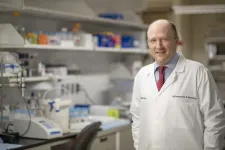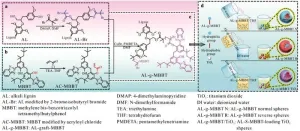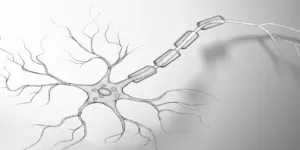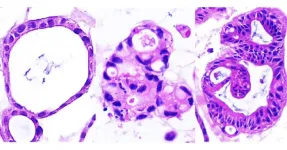(Press-News.org) In 2023, Science published the study, “How do social media feed algorithms affect attitudes and behavior in an election campaign?” by Andrew Guess et al. Now, Chhandak Bagchi and colleagues – in an eLetter that will appear on the 2023 study – state that the study’s “reporting and conclusions did not account for a series of temporary emergency changes to Facebook’s news feed algorithm in the wake of the 2020 U.S. presidential election that were designed to diminish the spread of voter-fraud misinformation. This issue may have led readers to misinterpret the results of that study and to conclude that the Facebook news feed algorithm used outside of the study period mitigates political misinformation...”
In an eLetter in response to Bagchi et al., Guess et al. acknowledge the criticism that their control condition changed during their experiment but say that, while that may have impacted how generalizable the results are to other contexts, it did not impact the validity and conclusion of their 2023 study. They agree that readers should not incorrectly conclude that the results of their 2023 paper speak to versions of the Facebook algorithm used outside the study period and highlight several places in their original study where they noted this. “We appreciate the opportunity to underscore the message to future readers that our results were in comparison to the feed-ranking algorithm used by Facebook at the time of the study.”
Bagcchi and colleagues say the results of the 2023 study by Guess et al. have implications for society – and for the research community. From a research perspective, “there is a need for independent research of social media platforms and consistent, transparent disclosures about major changes to their algorithms,” say the authors. “Laws such as the Digital Services Act in the European Union and the proposed Platform Accountability and Transparency Act in the U.S., if properly enforced, could empower researchers to conduct independent audits of social media platforms and better understand the potentially serious effects of ever-changing social media algorithms on the public.” (Among the authors on the Bagchi et al. eLetter, Przemyslaw A. Grabowicz recently moved from a position in the US to the University College Dublin, partly motivated by the introduction of the Digital Services Act.) Guess and colleagues write, “We…agree with Bagchi et al. on the importance of increased social media and algorithmic transparency for understanding the political impact of digital technologies.”
The two eLetters are accompanied by an Editorial by Science Editor-in-Chief Holden Thorp.
END
Science publishes eLetter on 2023 study by Guess et al., as well as response by Guess et al.
Summary author: Walter Beckwith
2024-09-26
ELSE PRESS RELEASES FROM THIS DATE:
Supreme Court ruling could strip protections from up to 90 million acres of US wetlands
2024-09-26
New interpretations following the recent Sackett v. Environmental Protection Agency (EPA) United States Supreme Court ruling could strip federal protections from up to 90 million acres of U.S. nontidal wetlands – nearly all that exist in the coterminous US – according to a new study. The findings reveal the potential scope and impacts of the regulatory changes and highlight the uncertainty introduced by the ruling. Enacted in 1972, the Clean Water Act (CWA) aims to restore and protect the quality of U.S. waters ...
Ancient, buried wood inspires a possible low-cost method to store carbon
2024-09-26
Inspired by an ancient buried log, researchers present a novel method to remove and store atmospheric carbon for hundreds of years or more. It involves locking woody biomass away in “wood vaults.” The approach could provide a cost-effective solution to mitigate climate change. Achieving net-zero carbon dioxide (CO2) emissions is crucial for combating climate change, yet reducing fossil fuel emissions alone is insufficient to meet the Paris Agreement's targets. To achieve these goals, carbon dioxide removal (CDR) methods must be implemented, including engineering solutions, like direct air capture, ...
Removal of marine plastic fishery debris greatly reduces entanglement threat for endangered Hawaiian monk seals
2024-09-26
Large-scale removal of discarded fishing gear and other plastic debris from the waters of Northwestern Hawaii meaningfully reduced entanglement rates of endangered Hawaiian monk seals, according to a new study. The findings, which are drawn from more than four decades of data, offer promising evidence that marine debris cleanup programs are successful and that reducing plastic inputs and scaling up removal efforts could maximize conservation outcomes across marine ecosystems worldwide. Plastic pollution severely threatens marine ecosystems, ...
Climate change likely to increase diarrheal disease hospitalizations by 2100s
2024-09-26
By 2100, hospitalizations from diarrheal diseases are predicted to increase in the city of Dhaka in Bangladesh as a result of climate change, even if global warming stays under 2 degrees Celsius. Farhana Haque and colleagues from University College London, London School of Hygiene and Tropical Medicine and icddr,b report these findings in a new study published September 26 in the open access journal PLOS Neglected Tropical Diseases.
As one of the world’s most densely population cities, Dhaka deals with a high burden of diarrheal diseases. While some studies have looked at how weather affects diarrhea in Bangladesh, few have examined the future impact of climate ...
Cleveland Clinic researchers discover new bacterium that causes gut immunodeficiency
2024-09-26
September 26, 2024, Cleveland: Cleveland Clinic researchers have discovered a new bacterium that weakens the immune system in the gut, potentially contributing to certain inflammatory and infectious gut diseases.
The team identified the bacterium, Tomasiella immunophila (T. immunophila), which plays a key role in breaking down a crucial immune component of the gut’s multi-faceted protective immune barrier.
Identifying this bacterium is the first step to developing new treatments for a variety of inflammatory and infectious gut diseases. These conditions, including inflammatory ...
Research reveals impact of gut microbiome on hormone levels in mice
2024-09-26
Francis Crick Institute press release
Under strict embargo: 19:00hrs Thursday 26 September 2024
Peer reviewed
Experimental study
Animals
Researchers at the Francis Crick Institute have shown that the balance of bacteria in the gut can influence symptoms of hypopituitarism in mice.
They also showed that aspirin was able to improve hormone deficiency symptoms in mice with this condition.
People with mutations in a gene called Sox3 develop hypopituitarism, where the pituitary gland doesn’t ...
Lignin-based sunscreen offers natural and high-performance UV protection
2024-09-26
In a significant breakthrough for the cosmetics industry, researchers have developed a new type of sunscreen using lignin, a naturally abundant polymer, and titanium dioxide (TiO2). The study, led by Yarong Li and Zhiguang Tang, was published in the Journal of Bioresources and Bioproducts and details the innovative use of a dual-modified lignin sub-microsphere to enhance the SPF and improve the color of sunscreens.
Lignin, a byproduct of the pulp industry, is known for its UV-absorbing properties and antioxidant capabilities. However, its application in commercial sunscreens has been limited due ...
How are stretch reflexes modulated during voluntary movement?
2024-09-26
How did the bodies of animals, including ours, become such fine-tuned movement machines? How vertebrates coordinate the eternal tug-o-war between involuntary reflexes and seamless voluntary movements is a mystery that Francisco Valero-Cuevas’ Lab in USC Alfred E. Mann Department of Biomedical Engineering, set out to understand. The Lab’s newest computational paper published in the Proceedings of the National Academy of Sciences (PNAS) adds to the thought leadership about the processing of sensory information and control of reflexes during voluntary movements—with implications as to how its disruption could ...
Organoids derived from gut stem cells reveal two distinct molecular subtypes of crohn’s disease
2024-09-26
Crohn’s disease — an autoimmune disorder — is characterized by chronic inflammation of the digestive tract, resulting in a slew of debilitating gastrointestinal symptoms that vary from patient to patient. Complications of the disease can destroy the gut lining, requiring repeated surgeries. The poorly understood condition, which currently has no cure and few treatment options, often strikes young people, causing significant ill-health throughout their lifetime. One barrier to making progress in developing treatments has been the lack of preclinical animal models that accurately ...
Rates of sudden unexpected infant death changed during the COVID-19 pandemic
2024-09-26
HERSHEY, Pa. — The risk of sudden unexpected infant death (SUID) and sudden infant death syndrome (SIDS) increased during the COVID-19 pandemic compared to the pre-pandemic period, especially in 2021, according to a new study led by researchers at the Penn State College of Medicine. Monthly increases in SUID in 2021 coincided with a resurgence of seasonal respiratory viruses, particularly respiratory syncytial virus (RSV), suggesting that the shift in SUID rates may be associated with altered infectious disease transmission.
They ...
LAST 30 PRESS RELEASES:
Power in motion: transforming energy harvesting with gyroscopes
Ketamine high NOT related to treatment success for people with alcohol problems, study finds
1 in 6 Medicare beneficiaries depend on telehealth for key medical care
Maps can encourage home radon testing in the right settings
Exploring the link between hearing loss and cognitive decline
Machine learning tool can predict serious transplant complications months earlier
Prevalence of over-the-counter and prescription medication use in the US
US child mental health care need, unmet needs, and difficulty accessing services
Incidental rotator cuff abnormalities on magnetic resonance imaging
Sensing local fibers in pancreatic tumors, cancer cells ‘choose’ to either grow or tolerate treatment
Barriers to mental health care leave many children behind, new data cautions
Cancer and inflammation: immunologic interplay, translational advances, and clinical strategies
Bioactive polyphenolic compounds and in vitro anti-degenerative property-based pharmacological propensities of some promising germplasms of Amaranthus hypochondriacus L.
AI-powered companionship: PolyU interfaculty scholar harnesses music and empathetic speech in robots to combat loneliness
Antarctica sits above Earth’s strongest “gravity hole.” Now we know how it got that way
Haircare products made with botanicals protects strands, adds shine
Enhanced pulmonary nodule detection and classification using artificial intelligence on LIDC-IDRI data
Using NBA, study finds that pay differences among top performers can erode cooperation
Korea University, Stanford University, and IESGA launch Water Sustainability Index to combat ESG greenwashing
Molecular glue discovery: large scale instead of lucky strike
Insulin resistance predictor highlights cancer connection
Explaining next-generation solar cells
Slippery ions create a smoother path to blue energy
Magnetic resonance imaging opens the door to better treatments for underdiagnosed atypical Parkinsonisms
National poll finds gaps in community preparedness for teen cardiac emergencies
One strategy to block both drug-resistant bacteria and influenza: new broad-spectrum infection prevention approach validated
Survey: 3 in 4 skip physical therapy homework, stunting progress
College students who spend hours on social media are more likely to be lonely – national US study
Evidence behind intermittent fasting for weight loss fails to match hype
How AI tools like DeepSeek are transforming emotional and mental health care of Chinese youth
[Press-News.org] Science publishes eLetter on 2023 study by Guess et al., as well as response by Guess et al.Summary author: Walter Beckwith



